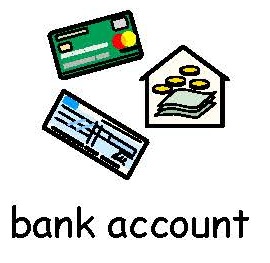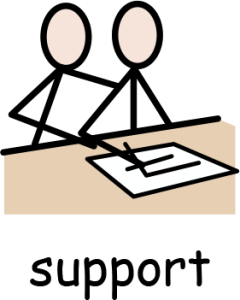Dosh Banking Guide Part One

In 2014, we created a report called Making Banking Easier. Our report highlighted some of the problems faced by people with a learning disability when banking.
It’s now 8 years since we published our report, and people with a learning disability still face many of the same challenges when banking. The advice we gave in the guide is still as important today as it was back then.
Bank accounts are a way to look after and use your money through a bank or building society. Bank accounts are used for a lot of different things. You can put your money into your bank account, whether its from work or benefit payments. The money in your account can be used to pay bills and buy things you like. You can also keep money in your account to save for things for the future, like a holiday.
Banking
Banks can offer you a lot of different services. They can offer loans, mortgages and more. They also offer different types of bank account including Savings Accounts, Basic Bank Accounts, and Current Accounts.
If you have a bank account, your bank may write to you about the other services they offer. You should check carefully before you agree to anything new, and talk about any changes with a friend or advisor.
Getting a Bank account
You should be careful when signing up to a bank account or another banking service. You need to make sure you know what you are signing, how it will work, and how much it will cost you. Speak to someone you trust before you agree to anything with your bank.
Changing and closing your bank account
If you’re not happy with your bank account anymore, you should speak to your bank. They will be able to help you to close or change your account. It is easy to change or switch your bank account to one you would prefer. If you find an account you would like to switch to, speak to this bank who will help you switch from your old account.
Sometimes your bank will make a change to your account. If this happens, they will write to you to explain the changes they are making.
How can I get support with banking?
Whilst you don’t have to tell your bank about your disability, it can help if you tell them what adjustments and support you need. This could be physical if you require a wheelchair, or supporting you to understand the information the bank is giving you.
What should banks be doing?
- start by assuming that you have capacity.
- have different types of accessible information before you get a service (like advertising) and when you get the service (like in letters). They must tell you about these and make them available.
- support you to understand the information they give you.
- offer different ways of accessing a service and tell you about these. This should include internet and phone services.
- have branches that you can visit. Some banks have a branch near you, or let you use their services through the Post Office.
- accept different things as proof of identity. They can tell you what different things they accept as proof.
- judge someone’s capacity to make a decision by following the Mental Capacity Act, if they are worried or unsure about someone’s capacity.
- explain why they will not give you a service or how they have decided that you do not have capacity.
- aim to use the least restrictive option for people who lack capacity.
- offer each person the best access to banking for them. This could include different types of bank accounts that can be used with support if someone does not have the capacity to manage a bank account by themselves.
With Capacity
If you have the capacity to manage a bank account but still want some support, there are different things you can do, including:
Support from your bank: Banks can give you different types of support. For example, they can give you a chip and signature card, instead of a chip and PIN card. A PIN is a secret 4-digit number you usually have to remember to use your card.
They can give you information in different formats (like Easy Read) and they can explain things to you if they are hard to understand.
Third party mandate: You give another person temporary access to your bank account. The bank will have a form to let you do this.
Joint account: You share a bank account with another person and you both have full access to the money.
Basic bank account: You have your own bank account but it has some limits on what it can do. The details are different between the different banks.
They are for people with a low credit score, people that do not want an overdraft and people that want to limit how much they can spend and reduce the risks and costs of having a bank account.
Ordinary Power of Attorney: You give someone else control over all or part of your money and finances. This will stop if you lose capacity.
Lasting Power of Attorney for property and financial affairs: You give someone power over your money and finances when you still have capacity.
They can help you manage your money if you would like them to, even if you have capacity to do so yourself
Without capacity
Appointee account: Your appointee (the person or group that manages your benefits for you) has a separate account for your benefit money (like the Dosh Client Account).
Lasting Power of Attorney for property and financial affairs: You give someone power over your money and finances when you still have capacity.
Later, when you lose capacity to look after your own money, your attorney can step in and manage your money and property for you.
Court of Protection decision: This is usually for a one-off or single decision, for example the court decides to let someone else sign a tenancy agreement for a house for you.
Court of Protection Deputy for property and financial affairs: The court decides to appoint someone (your deputy) who can make decisions about your money for you, if you cannot make those decisions yourself.
Your deputy must work hard to support you to make decisions about your money yourself. The deputy must only step in and make a decision for you, if you cannot make that decision, even with lots of help and support.
If you are interested in these options, speak to your bank to find out what they can offer you. The details of each account will be different between banks and it is a good idea to ask what other options they offer.
Remember, make sure you understand all the information about any banking service before you sign up for it.
If you want more information about making legal changes like power of attorney or the Court of Protection, visit the gov.uk website








